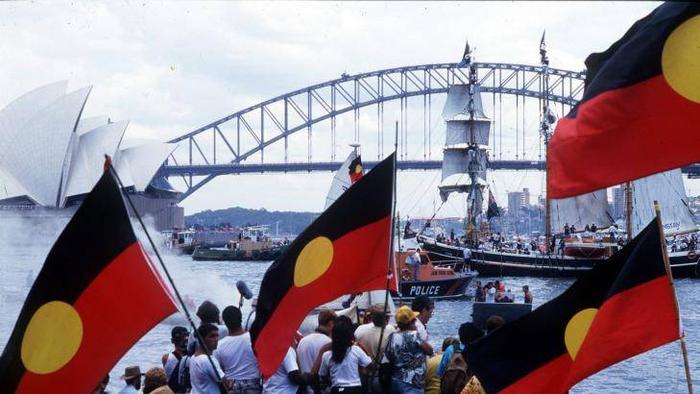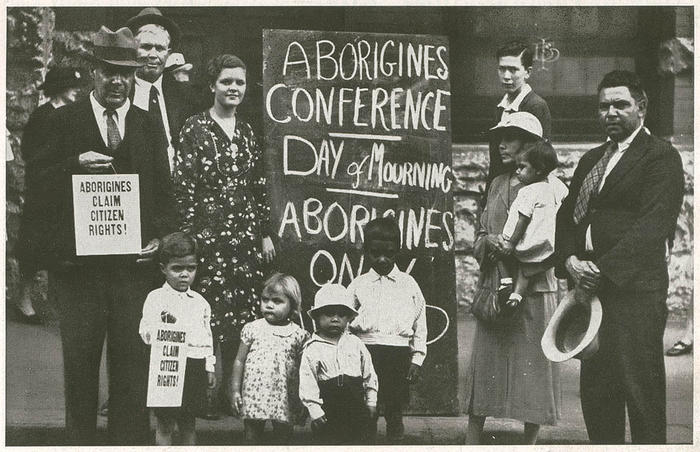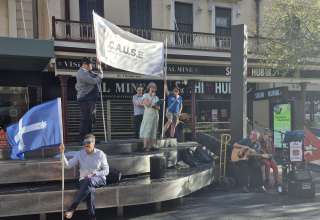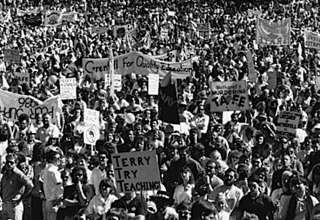Humphrey McQueen, 19 January 2017
Authorised by the never-died collective www.facebook.com/JoeHillorganiser
 Vox Pop illustrates that the most enthusiastic celebrants of Australia Day do not always know what happened on 26 January 1788 in Sydney Cove. Some think their holiday has to do with Captain Cook who had sailed past Sydney Harbour eighteen years earlier. Others run the event together with the creation of the Commonwealth from 1901 or wrap their flag patriotism around references to Gallipoli.
Vox Pop illustrates that the most enthusiastic celebrants of Australia Day do not always know what happened on 26 January 1788 in Sydney Cove. Some think their holiday has to do with Captain Cook who had sailed past Sydney Harbour eighteen years earlier. Others run the event together with the creation of the Commonwealth from 1901 or wrap their flag patriotism around references to Gallipoli.
We should sympathise with these people. First, they either have been taught no history of this country or they have been told about it in ways that would make Abetz sound scintillating. Secondly, and more significantly, what is being commemorated is hardly memorable: the day on which Captain Arthur Phillip, ran up a flag at Britain’s newest trading post and naval refitting station. Compare that piddling performance with even the skirmish at Eureka and it is hardly surprising that Australians have trouble fixing on the actualities of 26 January.
The formal Proclamation of the Colony of New South Wales by Judge-Advocate David Collins did not take place until 7 February. At no point did he claim the east coast for King and Empire; Cook had done that on 22 August 1770 in a couple of lines in his journal – which read almost like an act of absent mindedness. (Eight days earlier he had misspelt Australia as ‘Astralia’.)
Britain’s need to re-assert Cook’s claim against rival Mercantilist Empires took shape on 28 January when two French ships entered Botany Bay under the command of Jean-Francoise de la Perouse, who sailed away on March 10, never to be seen again.
None of this would not matter much were we talking about Wattle Day. Australia Day has become a flash point for political attitudes since the Bi-Centennial in 1988. At the time, the Left joined with indigenous Australians in protest. That commitment persists, though the Left has shrunk to grouplets while the indigenous movement has lost much of its militancy. The non-indigenous dissenters are reduced to ritual denunciation. The indigenes continue to pivot between the victimhood of ‘Invasion Day’ and the fight-back expressed in ‘Survival Day’. Nonetheless, neither of those descriptors so much as hints at the wars indigenes waged for country from their side of the frontiers.
We un-settler Australians can limp on in this fashion, or we can develop new ways to make Australia Day into one more site for conflict about the import of human activities here.
At present, reducing Australia Day to protests against what happened to the indigenous minority leaves us with no way of engaging with 97 percent of the population. Of course, there are Leftists who revel in that situation, concerned only to assert their moral superiority with their version of the Pharisees’ prayer: ‘Thank you god for not making me like other Australians – a racist’. Such unctuousness is an obstacle to changing attitudes. What we need is a challenge to the ways in which Australia Day is being marketed. In short, we need a red-armband history about the day itself, and then a proletarian perspective on what preceded and followed.
Now that’s a fact
A touch of pedantry won’t go astray. January 26 was not the day that the First Fleet landed. That had happened seven days earlier after the first of the ships entered Botany Bay, when the Eora, brandishing spears, had cried ‘Walla, Walla, Walla’.
For his part, Phillip would do all he could to fulfill that part of his instructions that enjoined him:
to endeavor by every possible means to open an intercourse with the natives, and to conciliate their affections, enjoining all our subjects to live in amity and kindness with them. And if any of our subjects shall wantonly destroy them or give them any unnecessary interruption in the exercise of their several occupations it is our will and pleasure that you cause such offenders to be brought to punishment according to the degree of the offence.
These sentiments were incompatible with prolonged intrusion. That London re-issued them to every new governor in the several colonies is incompatible with recent allegations that the invasion occurred in accord with terra nullius, a doctrine which formed in the late nineteenth century around the status of the polar regions. That the High Court accepted terra nullius in Mabo confirms the long-standing legal doctrine of Judicial Ignorance.
Finding Botany Bay too dry, Phillip sailed north on the 21st to come upon one of the finest harbours in the world. He returned on the 25th while the remainder of the fleet arrived on the 26th. Officers and marines landed. The officials drank four toasts and gave themselves three cheers after hoisting the Union Jack. (That flag would not include the red diagonal cross of St Patrick until after the slaughter of 30,000 Irish during the ’98 Rebellion led to the 1801 Act of Union.)
The male convicts were landed over the next two days and set to work erecting the pre-fabricated government house while they sought shelter beneath the palms. Those labours were the first proof that the convicts were not being dumped but used to add more value than went into the reproduction of their labour. The Navy took over the trade had had seen 40,000 convicts sold to North American and West Indian Masters in the sixty years before 1776.
The females came ashore on 6th February. That night, a storm broke over scenes of debauchery. Those who stole food were flogged the following morning; then, on 27th, one thief was hanged for this offence. On the following Sunday, the Rev. Richard Johnson took as his text: ‘What shall I render unto the Lord for all his benefits towards me?’
Again, and this time under southern skies, we see the inequalities and injustices that had created the conditions that had led many of the convicts to end up in an open-air prison. The more we learn about those first days ashore, the better able we are to contest the comforting view of the planting of British civilisation. Its agents began as they have gone, maintaining a social order divided between the floggers and the flogged, Masters and Servants, corporates and wage-slaves.
As one instance, the land grabbing N.S.W. Rum Corps celebrated the twentieth anniversary in 1808 by overthrowing Governor Bligh, an act of rebellion against the Crown. Repeating that act against the current crop of land grabbers in the mining corporates is a move worth trying any day of the year.
The progressive professor at the University of Sydney, G. Arnold Wood, observed in 1922 that, while the petty thieves were transported, the great criminals remained to govern the empire. True enough, but Britain’s elites had crooks to spare to oversee the pillaging of its colonies.
Australia: a Wog word
To balance the northern continents, Ptolemy had imagined Terra Australis Incognita, the unknown South Land, Austral being Latin for south. The phrase next appears in 1606 when the Spaniard de Quiros sailed into the New Hebrides, to name what he assumed to be a continent as Austrialia del Espiritu Santo. No, that Austrialia is not another spelling mistake. De Quiros is supposed to have altered Austral-is to Austria-lia in honour of the Austrian monarchy which claimed the Spanish Throne.
After Matthew Flinders had circumnavigated the continent in 1801-3, he preferred ‘Australia’ but stuck with Terra Australis as inoffensive to the Dutch designation of New Holland, Nova Hollandia, which, incidentally, they had recycled from the name they had given in the 1600s to their possessions in the West Indies. ‘New Holland’ was losing out to ‘New South Wales’ even before Governor Macquarie promoted the name ‘Australia’ from 1817.
‘Invasion’ Day
 The next step in this reclaiming the history of our struggles is to examine the place of the term ‘invasion’ in how the history has been told. There is nothing new or ‘politically corrected’ in this term. In 1938, on the sesqui-centenary of Phillip’s second landing, the Aboriginal Advancement League protested against the re-enactment on what they called ‘Invasion Day’. That the Aborigines promoted their cause in a monthly paper which they called Abo Call is another reminder that words come and go in regard to their social acceptability. Who dares say ‘Abo’ now?
The next step in this reclaiming the history of our struggles is to examine the place of the term ‘invasion’ in how the history has been told. There is nothing new or ‘politically corrected’ in this term. In 1938, on the sesqui-centenary of Phillip’s second landing, the Aboriginal Advancement League protested against the re-enactment on what they called ‘Invasion Day’. That the Aborigines promoted their cause in a monthly paper which they called Abo Call is another reminder that words come and go in regard to their social acceptability. Who dares say ‘Abo’ now?
Since the Bicentennial, the language of ‘invasion’ has been ridiculed, as if it were an invention of Marxists. ‘Invasion’ was the word that the small-l liberal (Sir) Keith Hancock used in his 1930 Australia, long the most influential short history of Australia. The right-wing Sir Archie Grenfell Price did the same in 1949 for his survey of North America and Australasia, White Settlers and Native Peoples. This extract gives the view then common among conservatives:
During an opening period of pioneer invasion on moving frontiers the white decimated the natives with their diseases; occupied their lands by seizure or by pseudo-purchase; slaughtered those who resisted; intensified tribal warfare by supplying white weapons; ridiculed and disrupted native religions, society and culture.
This academic convention of using ‘invasion’ did not stop Queensland A.L.P. premier Goss from censoring the term from the school curriculum, which was just one of the Goss-Rudd policies that perpetuated the legacy of Bjelke-Peterson.
The convict stain
Van Diemen’s Land changed its name to Tasmania in November 1855 in the vain hope of wiping the slate clean of the blood of both Palawa and convicts. By the 1950s, Tasmania had made it an offence to libel the dead by referring to their records as convicts. Some self-righteous descendants tore pages out of convict registers – only to discover that copies survived in England.
During the build up to the 1888 centenary, Melbourne papers poked fun at New South Wales when its premier Henry Parkes wanted to rename his colony as Australia, suggesting instead that it become Convictoria. The Bulletin loathed the idea of celebrating the centenary in 1888.
The belief that criminality could be inherited was pretty well universal; indeed, it was supposed that it could be suckled by the infants of free settlers from the breast of a convict wet nurse. Boosters therefore rejoiced that the blood of the Anzacs was washing away the stain of convict origins.
Victoria and South Australia commemorated their 100th as free colonies in 1934 and 1936 respectively and did not care to be associated with old lags. Yarraside pretended to be freer than free by promoting the land thief John Batman rather than the ex-convict John Pascoe Fawkner as its founder. Finding a convict ancestor did not became fashionable until around the Cook Bi-Centenary, subsequently cemented by the fad for family history.
Then came the 1938 sesqui-centenary which landed Sydney officialdom with the task of air-brushing the convicts out of the Commemorations. In response, the radical writers Miles Franklin and Dymphna Cusack collaborated on a novel, Pioneers on Parade, which mocked an old family for concealing its convict founder. It could have been modeled on the Wentworths.
That year, the Communist Party promoted a contrary vision, beginning from Lenin’s birthday on 17 January and concluding with May Day marches.
Naming the day
The name given to 26 January has been the site for several kinds of social conflict. Sydney celebrated Regatta Day from 1828. Before the fiftieth anniversary ten years later, self-styed Whig patriots gathered in Sydney hotels to push for a local parliament. On the other side were the Tory Exclusivists, born free of the convict taint.
As the Golden Jubilee of 1838 approached, the ‘patriots’ split between those who prided themselves on being native-born and those from anywhere else – a folly perpetuated with the foundation of the Australian Native’s Association in 1871. ‘Anniversary’ Day became some kind of public holiday that year and 26 January bore that tag into the 1950s.
At the same time, van Demonians asserted their identity by setting up Regatta Day on 2 December – the date on which Abel Tasman had anchored off shore in 1642. To confirm that all time-honoured traditions are no more than movable feasts, Regatta Day is now in February.
In South Australia, Proclamation Day falls on 28 December and is never likely to attract a crowd beyond those holiday-makers who had taken refuge at Glenelg. Western Australia now has as its ‘Day’ in July.
Enter a new twist to the battle of names. In the wake of the Britain’s genocidal war against Boer women and children, the Federal authorities in 1903 proclaimed 24 May to be Empire Day. That moniker disappeared with the Empire during the 1950s when it morphed into British Commonwealth Day only to be taken over in 1966 by the Queen’s Birthday around the current monarch’s official delivery in June, except in the West where she was not pop out until September.
Although Irish Catholics had always rallied for St Patrick’s Day on 17 March, during the renewed battle for Home Rule in 1911, those adherents of the Roman superstition – ‘under the auspices of Our Lady Help of Christians’ – took to referring to 24 May as ‘Australia Day’, flying the Red Ensign and St Patrick’s Cross over St Mary’s Cathedral in a further display of Pat-Riotism.
The Empire struck back in 1915 when the Red Cross designated 30 July 1915 as ‘Australia Day’ to raise comfort funds for the ANZACS, repeating the exercise next year. The Bulletin, despite being pro-war and pro-conscription, was sickened at the thought of the committee members’ purring ‘over the cream-puff at Government House.’
Just before 26 January 1932, the Lang Labor government in New South Wales, as part of its disinclination to enrich British bondholders at the expense of Australia’s unemployed, changed the name of the 26th from ‘Anniversary’ to ‘Australia Day’. Later that year, the Prime Minister and Labor rat Joe Lyons, yet another Irish-Roman, put his timid voice behind ‘Australia’ for the Day.
If not that date, when?
If we decide we can’t get by without some one day of the year, let’s make sure that the choice celebrates something which we did for ourselves and not something that was done to us.
Prime possibilities are the diggers round Ballarat taking the Eureka Oath on November 29: ‘We swear by the Southern Cross to stand truly by each other, and fight to defend our rights and liberties.’ Others are the defeats of the two conscription plebiscites in 1916 and 1917 and of the referendum to ban the Communist Party in 1951. All four will be annual celebrations in a socialist republic.
The choice has to be towards the lives of everyday Australians and not an occasion for another bout of trumpery from bunyip aristocrats. Moreover, a people’s day will value the joys of life, not killing and being killed.
The day should retain one element from the decades during which the holiday in late January was always a long weekend. Come to think of it, we could revive the victories that cut the length of the working day to eight hours by making every weekend a long one for a 32-hour week.
There is much more to 26 January than the start of an invasion which took 160 years to complete. Before the Fleet set sail, its occupants had been divided between the 1 percent and the 99 percent, as civilisation had been for thousands of years. As with the British enclosures and clearances, the invasion initiated a dispossession which turned its survivors into wage-slaves.
When the Aborigines Progressive Association, which had organised the 1938 protests against ‘Invasion Day’, reformed in 1963, its leaders reasoned: ‘Aborigines are a working-class people and it is only natural that we appeal to our fellow workers in the trade unions to support us in our struggle for justice and equality.’
We have seen how January 26 has much to do with class warfare among the un-settlers as well as with race. Only by campaigning on both aspects will it be possible to enlist the great majority of Australians in the struggles to put an end to capitalism which exploits and despoils as it oppresses.




